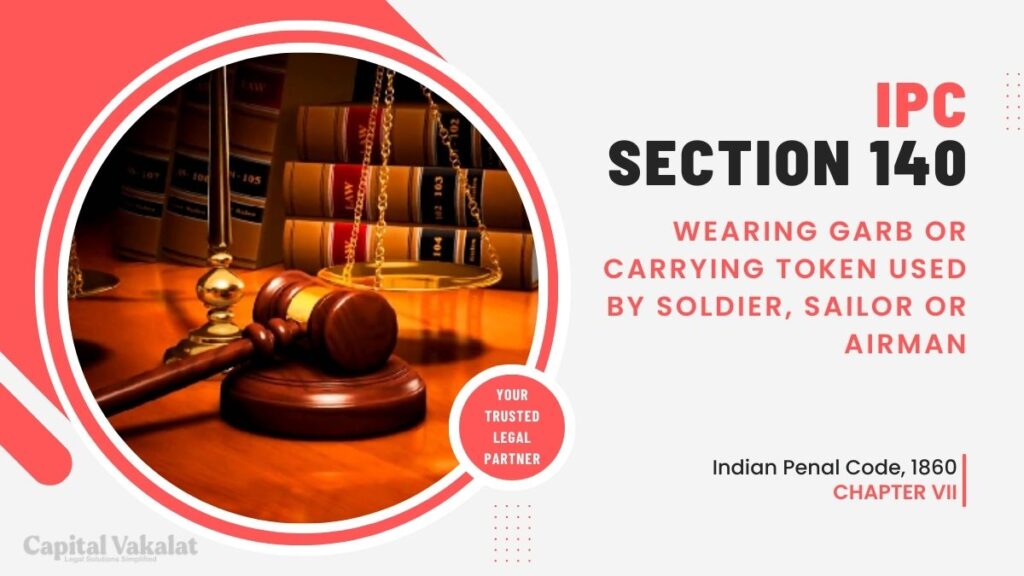Section 140 of the Indian Penal Code (IPC) is a legal provision that holds significant historical and contemporary relevance. Understanding this section is crucial, as it pertains to “wearing garb or carrying a token used by a soldier, sailor, or airman.”

This article will delve into the intricacies of Section 140 IPC, examining its historical context, legal implications, interpretation, and its relevance in the modern era.
Historical Context
Section 140 IPC finds its roots in India’s colonial past. During British rule, this provision was enacted to prevent individuals from impersonating military personnel. It aimed to maintain the integrity of the armed forces and safeguard national security. Understanding its historical context helps in comprehending its significance today.
Understanding Section 140 IPC
Section 140 IPC specifically addresses the act of “wearing garb or carrying a token used by a soldier, sailor, or airman.” This means that individuals who, without authorization, wear uniforms or carry tokens associated with military personnel may be subject to legal consequences. It is important to note that this provision applies to civilians and not members of the armed forces.
Legal Implications
Violating Section 140 IPC can have severe legal consequences. Offenders may face imprisonment or fines, depending on the severity of the violation. The law ensures that military uniforms and tokens are not misused or worn by unauthorized individuals. This is vital to maintain the honor and integrity of the armed forces.
Interpretation of the Law
Over the years, Section 140 IPC has been subject to legal interpretation in various cases. Courts have examined the nuances of the provision and its application. Notable case studies serve as valuable references for understanding the legal aspect of this section.
Relevance Today
While the historical context of Section 140 IPC is significant, its relevance today cannot be understated. In the modern world, this provision plays a crucial role in safeguarding the identity and reputation of military personnel. It ensures that military uniforms and symbols are not misused, especially in the age of increasing security concerns.
Legal Provisions and Amendments
It’s important to keep in mind that legal provisions may change over time. Amendments to Section 140 IPC may occur to adapt to evolving circumstances. Being aware of these changes is essential for individuals to remain compliant with the law.
Consequences of Violation
The consequences of violating Section 140 IPC can be severe. Offenders may face imprisonment, fines, or both. It’s essential to understand who may inadvertently infringe upon this section and take appropriate precautions.
Controversies and Debates
Like many legal provisions, Section 140 IPC is not without controversies and debates. Some argue that it may infringe on personal freedom, while others maintain that it is necessary for national security. The differing opinions add depth to the discussion surrounding this section.
Case Examples
Real-life case examples illustrate the practical application of Section 140 IPC. These cases highlight how the law was enforced and the consequences faced by those who violated it. They provide insights into the working of the legal system.
Compliance and Prevention
To avoid unintentional violations of Section 140 IPC, individuals should be aware of the law’s specifics. Avoiding the unauthorized use of military uniforms and tokens is the best preventive measure. It’s crucial to respect the sanctity of these symbols.
Conclusion
In conclusion, Section 140 IPC addresses the act of “wearing garb or carrying a token used by a soldier, sailor, or airman.” It holds both historical and contemporary significance and plays a vital role in upholding the integrity of the armed forces and national security. Understanding this legal provision is essential for compliance with the law.
FAQs
What are the penalties for violating Section 140 IPC?
Penalties for violating Section 140 IPC can include imprisonment and fines, depending on the nature and severity of the violation.
Are there any exceptions to Section 140 IPC?
Section 140 IPC generally applies to all civilians. There are no exceptions unless authorized by the military.
Can reenactors or actors wear military uniforms without consequences?
Actors and reenactors may wear military uniforms if it is part of a legitimate performance, and they have the necessary permissions.
Why is Section 140 IPC important today?
Section 140 IPC is crucial today to maintain the sanctity of military symbols and protect national security in an era of heightened security concerns.